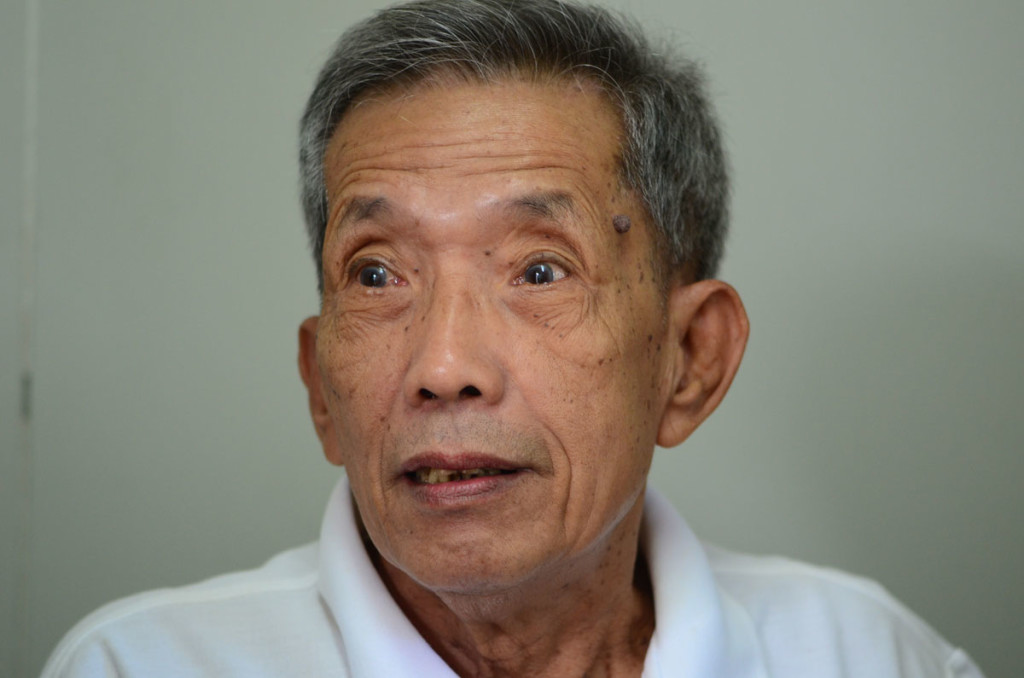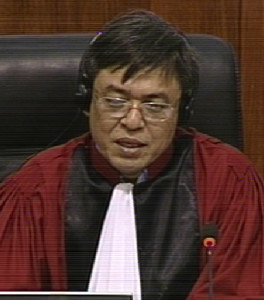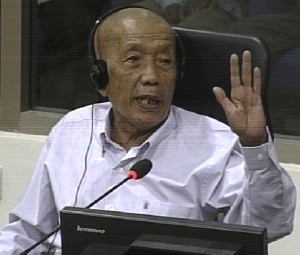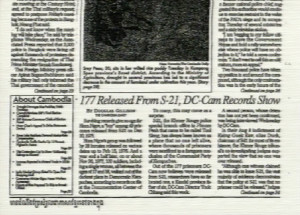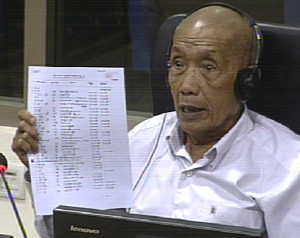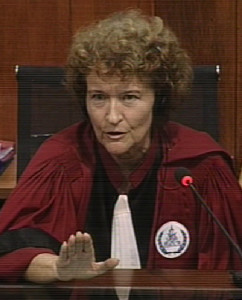Vietnamese Party Supported Rebellion Against Pol Pot, Duch Says
Former head of S-21 prison Kaing Guek Eav, alias Duch, delved into foreign politics under the lead of Co-Counsel for the Defense of Nuon Chea Victor Koppe, who cross-examined the witness all day. Before he reached that subject, the witness dealt extensively with S-21 and Prey Sar.
The Party’s definition of “arbitrary arrests”
This morning, Co-Counsel for the Defense of Nuon Chea Victor Koppe resumed his questioning. He reminded the courtroom that yesterday, the witness talked about the incrimination of party members and their surveillance. Mr. Koppe then asked Duch to elaborate on “arbitrary arrests”, a term he used in his June 13th testimony[1]. Duch answered this quote was the political line of the party: the arrests made outside this scope were considered illegal. An “arbitrary arrest” was an arrest that was not approved by the party. He cited the example of Nat, who arbitrarily made the arrest of individuals at Ta Khmao. When Duch and Nat went to see Son Sen, Son Sen “took off his glasses and reminded us about illegal arrests”, recalled the witness.
Mr. Koppe went back to one of yesterday’s subject: the arrests of Yim Sambath and Chan Chakrey, about which he asked for more details. Namely, the Co-Defense Counsel wanted to know if the witness knew the reason for Chan Chakrey’s arrest. Duch was unable to provide a pertinent answer, and even after Mr. Koppe insisted, repeated:
“Arrests made by S-21 were to be endorsed by the upper echelon”
The Co-Defense Counsel then asked the witness about former Northern Zone Commander Koy Thuon and the reason for his arrest, which the witness had limited knowledge about. Once again, the witness characterized the authority structure by saying that Koy Thuon was sent to S-21 after an order from the Central Party. Duch did not know about the circumstances of the arrest of Koy Thuon.
“Koy Thuon was a gentleman. He was notorious for having affairs with women.”
President and Judge of the Chamber Nil Nonn interrupted the witness before he could go on: “if you do not know the answer, please say so.”
Duch denied it was not difficult to arrest Koy Thuon[2]. Upon Mr. Koppe’s questioning however, he was able to describe what was under the meaning of “absolute orders” not to torture Koy Thuon[3] [4]. Son Sen monitored the interrogation every day over the phone[5].
“I had to be careful since I was once his subordinate.”
Later on recalled the witness, Son Sen sent Koy Thuon to be executed[6] for being an“enemy of the party”.
Tea run akam
The term in Khmer was previously used in Court proceedings to mean “torture”. The President of the Tribunal Nil Nonn corrected the use of the term last April, specifying that “this generic term for torture is very common in the context of Khmer language, including when a father disciplines his child.” [7] Mr. Koppe sought to have the witness define the term according to the practices conducted at S-21, and Judge Claudia Fenz as well as Judge Nil prohibited Mr. Koppe putting this question to the witness, saying that the witness could not be asked to react to the legal definition of “torture” or “cruel and inhumane treatment”. Finding a different angle, Mr. Koppe asked:
“Mr. Witness, what kinds of behavior tea run akam could involve in an ordinary Khmer family in your time?”
“My mother beat me when I did something wrong […] It was discipline against any violation of the family discipline. During the CPK regime, I used the term to implement to disciplinary rule.”
Judge Fenz interjected once again, questioning the pertinence of Mr. Koppe’s inquiries. Mr. Koppe shifted his focus and had the witness assert that tea run akam was only used as a “last resort” on prisoners[8]. However, a few further questions were sufficient for the witness to state that he was not well-aware of the how specifically the interrogations were conducted, as he only personally interrogated important prisoners, and did not use these methods on them.
“Mr. Witness, is it true that only in specific situations, when interrogators reported on what kind of methods they had used, would you know what had happened during the interrogation?”
“That is true.”
Hor at S-21
After a short break announced by the President, Co-Counsel for the Defense of Nuon Chea Mr. Victor Koppe listed 16 previous quotes from witness Duch for half an hour[9]. For the sake of thoroughness, these 16 quotes confirmed that Hor was in charge of the interrogation of most of the detainees at S-21 and was the one ordering the smashing of prisoners until the incident during which a prisoner was killed without having given a confession. Duch also corroborated that 95% of people working at S-21 came from Division 703, which former S-21 list-keeper Suos Thy had not been able to confirm when he came to testify on June 6, 2016[10].
S-21 and Prey Sar, the rice fields or S-24
Kaing Guek Eav, alias Duch, was asked to elaborate on the arrival of prisoners at S-21 and the eventual connections between the prisoners who stayed there and the ones who were sent to work at the rice fields in Prey Sar. First off, the witness confirmed that prisoners arrived on Street 360, close to the now Beehive Radio Station[11]; he then added some prisoners who had arrived at S-21 and were subsequently moved to Prey Sar[12].
Mr. Koppe quoted parts of previous statements made by Nhim Kim Sreang, Chief of the Photography Unit, which evidenced that prisoners were photographed at S-21 before they were sent to the rice fields (Prey Sar)[13]. Duch, noticeably stirred, gave an unusually short reaction to these quotes: “the statement by Kim Sreang is not correct. It is completely wrong”, followed by a silence. Mr. Koppe had to urge the witness to elaborate: “prisoners from S-21 were not sent to the rice fields”, Duch said.
Mr. Koppe seemed like he wanted to push the witness further. He asked:
“Mr. Witness, you were not aware of what was going on for about 90% of the work at S-21, is that correct? […] You have testified you stayed in your house, reading confessions from 7am in the morning to 11pm?”
“[…] Chief of S-21 was not a stupid person! Chief of S-21 knew everything!”
Witness Duch looked rather upset with the Co-Defense Counsel’s line of questioning, referring to himself in the third person. Mr. Koppe did not back down:
“But Mr. Witness, yesterday, I confronted you with numbers of the armed forces, and you didn’t even know [how many were present in your regiment]. How is that a credible testimony, if you don’t even know how many men were in your regiment?”
Senior Assistant Prosecutor Dale Lysak objected, arguing an improper question on the part of the Defense; he was immediately followed by Judge Fenz, who asked that the witness go back to testifying upon evidence. Mr. Koppe puffed: he had been trying to show that Duch did not have effective control and knowledge over what happened at S-21.
After a lunch break, Co-Counsel for the Defense of Nuon Chea Victor Koppe kept his focus on Prey Sar. Duch stated that Prey Sar was not a prison, as workers were not called “enemies”. He confirmed his previous statement that “[i]t was not a place for interrogation, detention or execution but a place for production and reeducation; they were not accused prisoners but people with disciplinary problems within their units.”[14] However, he did not have any knowledge further than overall supervision[15].
Kampong Chhnang airfield
According to Duch, Kampong Chhnang Airfield was under the supervision of a Comrade from Division 502. The witness reacted to a previous statement he made, according to which “the North Divisions such as Division 310, Division 450, and Comrade Chin’s Division were moved to construct the airport”[16]: he did not know when they were moved. Mr. Koppe asked the witness whether he knew who had the authority to decide which prisoners were to be sent to S-21 or assigned to stay. The witness accused the Co-Defense Counsel of being repetitive: “the person making the decision was Son Sen”, he said.
The witness also confirmed that Son Sen and Office 870 were the ones who decided on different categories of prisoners, which were spelled out in a meeting with other higher ranked officials, while talking about Chan Chakrey:
“Operational methods: continuous education is imperative. It is imperative to purge no good elements, absolutely in the sense of an absolute class struggle. The purge is premised on three principles. Category 1: the dangerous category, they must be absolutely purged. Category 2: the ordinary liberal category, they must be educated and educated again in our education schools. Category 3: those who have merely been sighted by the enemy, merely believing in the enemy incitement […]”.[17]
Victor Koppe and DC-Cam
Mr. Koppe departed from the rice fields and focused on another topic.
“Mr. Witness, have you ever heard of an organization called DC-Cam?”
Duch confirmed he knew about the organization and of its director, Youk Chhang. In a 2008 Cambodia Daily article, Mr. Koppe confronted the witness with the headline of the article “177 released from S-21, DC-Cam records show”, as well as excerpts in relation to the release which contradicted previous declarations of the witness[18]. Duch answered:
“Journalists can make any comment at their wish, but S-21, under the absolute dictatorship policy of the CPK [Communist Party of Kampuchea], anyone who was arrested and sent to S-21 was arrested and smashed.”
S-21 numbers and counting
As Mr. Koppe moved on to the estimate of the number of prisoners at S-21, there was some confusion relating to the different lists of prisoners. The new prisoners’ list made by Co-Investigating Judges in Cases 003 and 004 seemed to indicate that there were 15,000 or so prisoners, of which “only” 5,512 individuals have an execution date available. However, as Senior Assistant Prosecutor Dale Lysak pointed out, the witness could not be asked to speculate about the numbers, and Duch firmly denied he was entitled to give statistics.
The witness gave lengthy explanations about the lists, arguing that he should be given all the lists because the last one he had was at his trial in 2012, which listed 12,000 S-21 victims. Mr. Victor Koppe, frustrated that Duch was not getting to his point, sighed and moaned. He decided to progress in his line of inquiry and asked the witness about another list of high-level cadres[19]. This list did not appease Duch’s insistent request, who said that this list was not from S-21 nor from the Democratic Kampuchea Regime. Pol Pot’s name was in the title, which never occurred.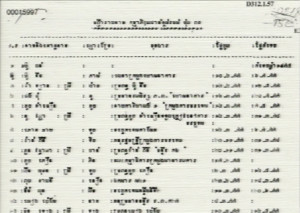
“Do you have any idea of who made up this list?”
“They had money to spend and an easy life, because they drew up this list. It was not drawn up by the Democratic Kampuchea.”
The courtroom, incredulous at Duch’s sarcasm, watched as Co-Defense Counsel Koppe asked Duch if he knew some of the names in the list. The witness clung on to his argument that he had never seen the document before and that it was never drawn up by the Party:
“Yes or no? Let me tell the truth. This list is suspicious, I think it is not contemporaneous, why was it not shown to me?”
It took an intervention by President of the Trial Chamber Nil Nonn to end the debate: the witness stated the document was not from S-21, there was nothing to add.
“Important” and “non-important” prisoners
Mr. Victor Koppe then continued questioning the witness, this time aiming at knowing how many “important prisoners” had gone through S-21. He mentioned a document from the People’s Revolutionary Tribunal held in Phnom Penh, which listed important culprits arrested from 1976 to 1978, estimated to be at least 243[20]. Duch stonewalled and said he did not want to speculate, which seemed to annoy Mr Koppe:
“Mr. Witness, you had repeatedly said that you were in charge of the important prisoners. Can’t you give an estimate of how many were considered important or non-important prisoners?
“I want to review the list. […]”
“But Mr. Witness, you were there at the time.”[21]
With one last push before the break, Mr. Koppe had the witness state that the division was made between the “important” and “non-important” or “ordinary” prisoners according to their rank, the information they possessed, as well as if the upper echelon wanted to know about the confession of one individual.
As to a previous quote “prisoners only came from within the Party, not from the popular masses”, either from the Co-Investigating Judges as well as Duch[22], Mr. Koppe asked the witness if it was true that the main purpose of S-21 was to detain prisoners who were from the party and combatants. The witness confirmed this.
The role of Vietnam
“The major task of S-21 was searching for traitors, finding poison, arms and Vietnamese soldiers.”
Le Yun, spelled Le Duan in French and English, was the leader of Socialist Republic of Vietnam. Duch testified that he had only seen him from a distance, as well as heard of Vietnamese military Vo Nguyen Giap. Pol Pot and Le Duan, according to Duch, were that 1973 or 1974, Le Duan tried to convinced Pol Pot to negotiate with the U.S., in exchange of which he would get a large sum of money. He also convinced him to let the Vietnamese troops leave the Democratic Kampuchea.
Mr. Koppe then attempted to tie previous declarations by the witness to the declaration of war with Vietnam (31/12/1977 according to the witness): “I would prefer talking about war crimes from that period”[23]. The witness specified that there were some military movements and fighting at the border before that date. The Center Party meeting in May 1977 decided on that matter, and it was clear: there was fighting between the party before the declaration of war, and both sides arrested prisoners of war, extracted confessions and broadcasted them on the radio.
Mr. Victor Koppe, growing impatient after the witness expanded on the relations between Democratic Kampuchea and Vietnam, asked[24] [25]:
“What did you know about Le Duan’s foreign policy ambition between 1975 and 1979 regarding the Democratic Kampuchea?”
“Pol Pot made mention that Le Duan had a big ambition, and if Le Duan could not convince Pol Pot, […] a coup d’état would be conducted or forces would come to attack Pol Pot, he said.”
“China and Vietnam: the Roots of Conflict”
In the last minutes devoted to his questioning, Co-Defense Counsel Victor Koppe made mention of a book from American academic, William J. Duiker: “China and Vietname, the Roots of Conflict”.[26]
“If Hanoi hoped to prevent China from stabilizing its position in Phnom Penh, it must act soon. An open invasion like Vietnamese troops would be a decisive solution but it could cause serious international repercussions and possibly provoke a direct confrontation with China. A general uprising led by anti-Pol Pot rebels in Cambodia, and supported discreetly by the Socialist Republic of Vietnam was less risky and certainly less costly, but success would be less certain. In the end, the plenum [Central Committee of Vietnamese] decided to proceed with plans to provoke an internal uprising led by So [Sao] Phim, while keeping in reserve an alternative plan to topple the Phnom Penh regime with a direct intervention.”
Mr. Koppe went on with the quote, in which the author confirmed that the Vietnamese party leadership had approved a proposal to remove the Pol Pot regime by an internal uprising in February 1978. However, in May Pol Pot forces attacked, and Sao Phim was arrested and executed.
Judge Fenz interrupted Mr. Koppe to ask him if the sources for this book were available, to which Mr. Koppe answered that he was surprised his document was questioned. “It is not often asked when other academics are cited, I might say”. He then added that this book had been admitted as evidence in Case 001.
The witness stated that to him, this seemed consistent with the events in Cambodia at the time, which he knew through Pol Pot. Pol Pot would argue that such threats existed to the regime during study sessions.
In the notebook by either Ponh or Tuy, it was written that the victory over the Vietnamese and Sao Phim’s organization in 1978 was equal to the April 17, 1975 victory: it was a “great leap victory.”[27] “Why was it that important to call it that?” asked Mr. Koppe.
“We won against Lon Nol in April 1975. Lon Nol was considered the U.S. puppet in the CPK. […] Forces of Yum and Phim belonged to the Democratic Kampuchea; Yum and Phim were then arrested.”
Before the hearing was adjourned, Judge Lavergne remarked that the sources asked by Judge Fenz regarding Mr. Duiker’s book were not accurate: Mr. Koppe will have to answer to this inquiry in the morning as Kaing Guek Eav, alias Duch, will continue his testimony tomorrow, June 22nd at 9am.
Featured image: Victor Koppe in 2015 (ECCC)
[1] 13/06/2016, 11h10. “In terms of implementation, I was repeatedly indicated and warned not to make any arbitrary arrest of anyone”.
[2] E3/2117, at 00081344 (EN), 00192975 (KH).
[3] E3/65, at 00147519 (EN), 00146480 (KH).
[4] 16/06/2009. E3/5800: “so I only slapped into the face because he gave into my interrogation already, and I could not beat him much.” This was not deemed torture by the Chamber.
[5] E3/5771, at 00185500-01 (EN), 00185492 (KH), 00185509 (FR).
[6] E3/1570, at 00154194 (EN), 00154224 (KH).
[7] 27/04/2016: 14h05.
[8] E3/454, at 00147603 (EN), 00146660 (KH), 00149924 (FR).
[9] (quote 1) E3/5748, at 00153568 (EN), 00153445 (FR), 00153459 (KH). “I note that I personally took charge of important detainees. For the others, it was Hor”.
(quote 2) E3/170, at 00154193 (EN), 00154223 (KH), 00154208 (FR). “Hor took care of the Phnom Penh sector in every field. Interrogation as well as document reading. Anything in the Phnom Penh sector would go through Hor and then through me.”
(quote 3) E3/5792, at 11h43. “He managed all the daily activities at S-21”.
(quote 4) E3/5772, at 00209169, 00186194, 00186209-10 (FR). “Hor introduced this practice requiring interrogators to submit daily reports to him […]. In this way, he could better supervise the progress of the interrogation. Interrogators reported directly to me for the important prisoners.”
(quote 5) E3/1576, at 00160722 (EN), 00159563 (KH), 00159584-85 (FR). “Hor was relatively autonomous in his work.”
(quote 6) E3/1578, at 00194549 (EN), 00178023, 00178035-36. “Hor had the power to decide arrest at the regiment level.” Duch specified that it was only at Prey Sar.
(quote 7) E3/770, at 00177609 (EN), 00177602 (KH), 00177615 (FR). “Hor was responsible to the party for [execution] decisions”.
(quote 8) E3/5771, at 00185500, 00185492, 00185509 (FR). “For simple combatants, Hor controlled everything and could order tt.” Duch confirmed this.
(quote 9) E3/5771, at 00185502 (EN), 00185494 (KH), 00185511 (FR). Interrogator who allegedly raped a prisoner. “the interrogator guilty of the rape was simply assigned to interrogate another person. He was not under my supervision but from 703, so Hor was responsible for him. There were three categories of staff working at S-21: the ones that came from M-13, a dozen; the ones that came from Division 703, around 300-400 and Kampong Cham province, around 40-50. I was directly responsible for the first category and Hor for the two others. I was also responsible overall as head of S-21.”
(quote 10) E3/452, at 00147567 (EN), 00146553 (KH), 00147929 (FR). “the tasks of detention and smashing had been the burden of Hor ever since the creation of S-21”.
(quote 11) E3/455, at 00149911 (EN), 00146672 (KH), 00149936 (FR). “all persons in detention had to be smashed, especially related to S-21. Hor decided on the executions”. Duch answered that it was initially made by the Party, but that Hor did it in practice.
(quote 12) E3/65, at 00147526 (EN), 00146488 (KH), 0017900 (FR). “I never personally killed anyone with my own hands ever since I was chairman at M-13. I was terrified. The ones who gave the orders in this matter were Kim Vot, alias Hor. And the implementer was chairman of my special unit Him Huot.”
(quote 13) E3/452, at 00147568 (EN), 00146554 (KH), 00147930 (FR).
(quote 14) E3/4801, at 9h28. “Son Sen told me to tell Hor not to decide unilaterally on executions. He instructed that he ask my opinion first before taking them.” Duch replied that after an incident when he took out a prisoner who had not yet confessed: “Yes, I had to approve after that.”
(quote 15) E3/452, at 00147568 (EN), 00146554 (KH), 00147931 (FR). “Before the execution, I had to clearly confirm that the confessions were extracted.”
(quote 16) E3/358, at 00244243 (EN), 00244236 (KH), 00244248 (FR). “Lin secretary chief of S-71, became very powerful. Could work with Hor and Huy without going through me.”
[10] See “I don’t recall”, Motto of a Hindering Day for the Defense, The Cambodia Tribunal Monitor, June 6, 2016.
[11] E3/5748, at 00153567-8 (EN), 00153459-60 (KH).
[12] Him Huy testified 3/05/2016, 15h38.
[13] E3/7639, at 00162736 (EN), 00162713 (KH), 00338079 (FR). Sreang: “after their photo was taken, where were they sent? The majority were sent to farm rice, but aside from that, I don’t know. They were mostly minor people. […] I saw that they farmed rice.”
And 00162734 (EN), 00162710 (KH), 00338076 (FR). 22/10/2007. “One day, when I was developing, photos were damaged and when I requested to retake the photos, I could only find two. Brought in yesterday, where are they? And Duch answered: They have all gone to the rice fields. Go photograph them at the rice fields.”
[14] E3/1570, at 00154192 (EN), 00154222 (KH).
[15] E3/1578, at 00194547 (EN), 00178021 (KH), 00178033 (FR).
[16] E3/19/42.3.2, Q&A 28.
[17] E3/13, at 00940353 (EN), 00052413-4 (KH), 00344983 (FR). Minutes of a meeting with the Secretaries and the Deputy Secretaries of divisions Oun, Song, Dim talk about Chakrey.
[18] E3/3992, at 00548253 (EN), 00814871-73 (KH), 00836686-87 (FR).
[19] E3/8463, at 00015997 (KH).
[20] E3/1993, at 00064826 (EN), 00796735 (KH), 00795330 (FR). And E3/8463.
[21] Emphasis added.
[22] E3/772.
[23] E3/5772, at 00209176 (EN), 001861202 (KH).
[24] E3/15 251381 (EN), 00234079 (KH).
[25] E3/9836A, at 01202363 (KH).
[26] E3/7340, at 01113861 (KH), 01113861 (EN).
[27] E3/834, at 00184498 (EN), 00077476 (KH).

